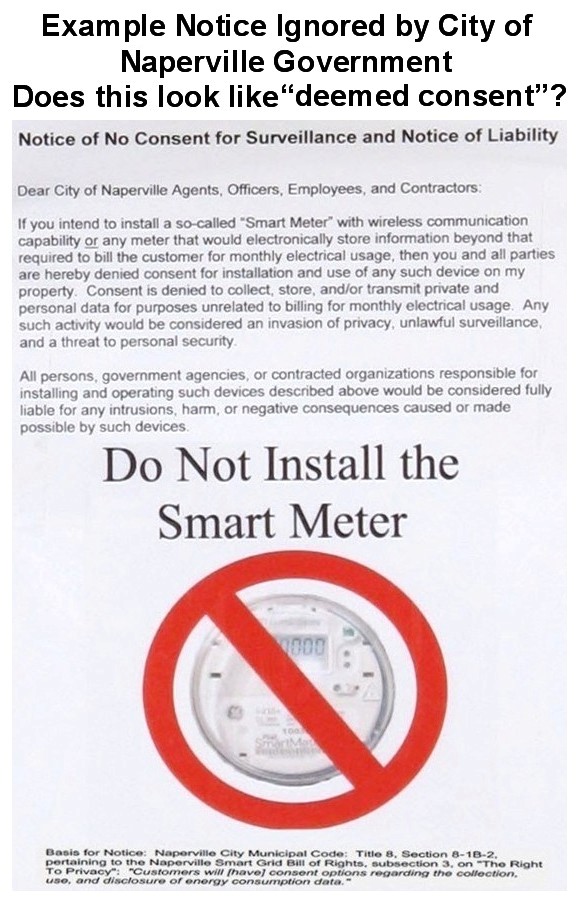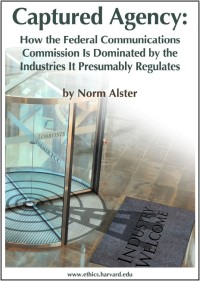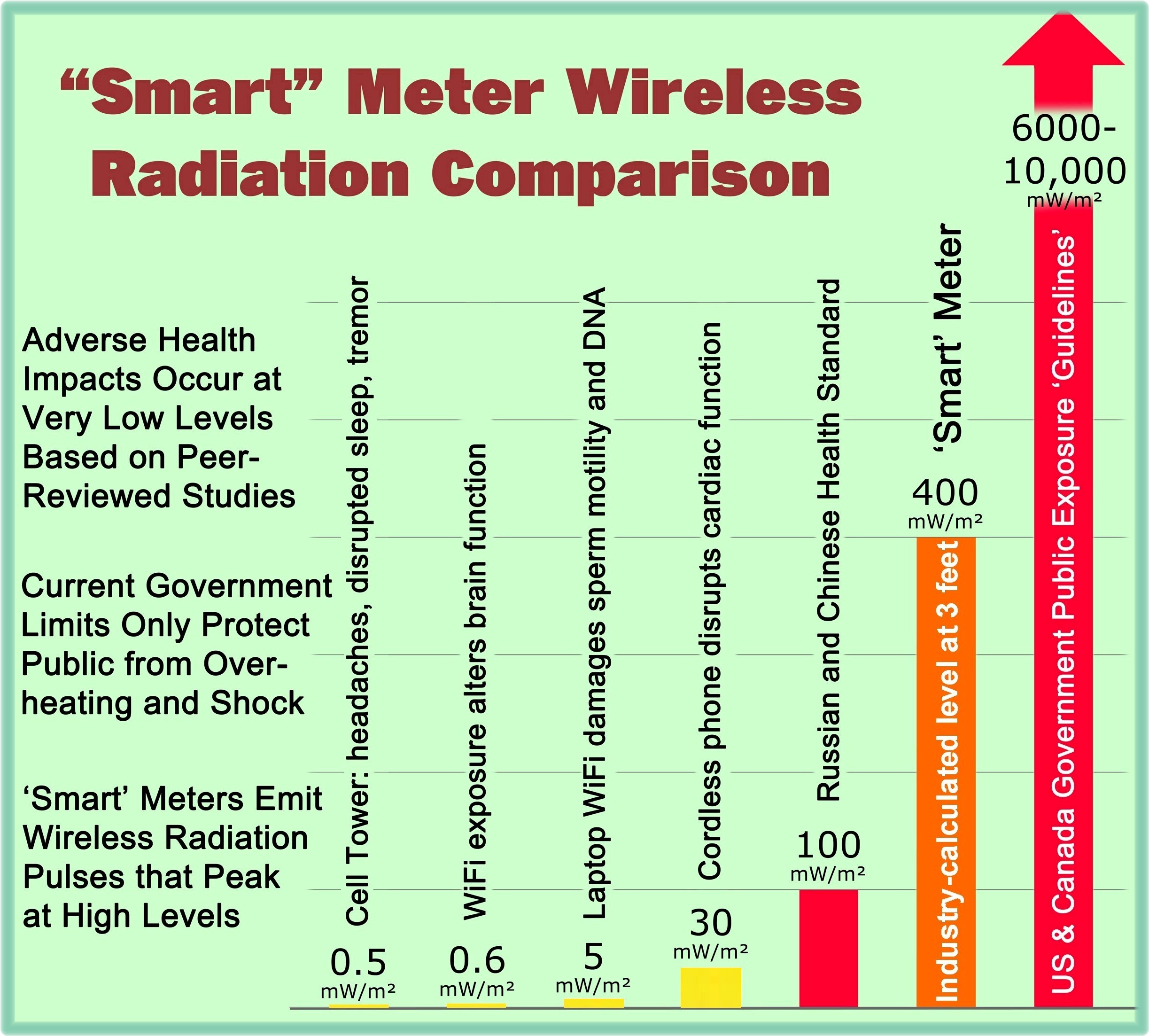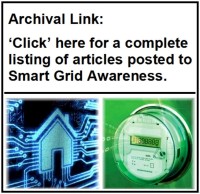by K.T. Weaver, SkyVision Solutions
 In July I reported on the ruling by a Federal Judge for the Naperville, Illinois smart meter lawsuit. In my article I stated that the Judge “denied an unreasonable search and invasion of privacy claim in the case of the Naperville Smart Meter Awareness (NSMA) v. City of Naperville, thereby condoning Fourth Amendment violations of the U. S. Constitution.”
In July I reported on the ruling by a Federal Judge for the Naperville, Illinois smart meter lawsuit. In my article I stated that the Judge “denied an unreasonable search and invasion of privacy claim in the case of the Naperville Smart Meter Awareness (NSMA) v. City of Naperville, thereby condoning Fourth Amendment violations of the U. S. Constitution.”
In his ruling, the Judge acknowledged that “smart meters are capable of capturing discrete details of behavior” but stated that since “NSMA has failed to allege that the City is actually collecting and using the data … to analyze the private lives of its residents, there is no cognizable claim upon which relief can be granted.”
So based upon this Judge’s reasoning, it is acceptable to invade your privacy by collecting massive amounts of data about what goes on in your home as long as you cannot prove the government utility, in this case, actually used the information for other than billing purposes.
 The Judge’s logic, however, conflicts with a well-known 2001 Kyllo thermal imaging case where the Supreme Court concluded that in the home “all details are intimate, because the entire area is held safe from prying government eyes.” [emphasis in original] Accordingly, since all details are intimate and private in the home, there can be no justification for unnecessary and excessive collection of data that invades the sanctity of the home.
The Judge’s logic, however, conflicts with a well-known 2001 Kyllo thermal imaging case where the Supreme Court concluded that in the home “all details are intimate, because the entire area is held safe from prying government eyes.” [emphasis in original] Accordingly, since all details are intimate and private in the home, there can be no justification for unnecessary and excessive collection of data that invades the sanctity of the home.
In reviewing earlier rulings in the Naperville case, I found that the Judge previously rejected a Kyllo argument due to the issue of consent, i.e.:
“It is the consent, not the nature of the technology being used, that distinguishes this case from Kyllo and Jones. … “Plaintiffs … have consented to such aggregate measurements…”
The Judge reiterated the issue of consent in the latest ruling in July by stating:
“NSMA members are deemed to have consented through their usage of electricity services knowingly supplied by the City.”
Note: The Judge in the Naperville case compared the consent for smart meter installations to that of customers surrendering the privacy interests of their phone number by subscribing to telephone service: “See Smith, 442 U.S. at 743–44; see also United States v. Flores-Lopez, 670 F.3d 803, 807 (7th Cir. 2012) (‘[B]y subscribing to the telephone service the user of the phone is deemed to surrender any privacy interest he may have had in his phone number.’). ” This comparison seems naive and specious. A more appropriate comparison for smart meters would be that granular data collection is more similar to listening to (or recording) your private telephone conversations, rather than someone just knowing your phone number.
Does the Judge’s presumption of “deemed consent” seem appropriate to you? Many Naperville residents (and NSMA members) sent letters or posted notices to the City of Naperville telling it not to install a smart meter and that consent was not granted for such installations. The City simply ignored those notices and proceeded to install the smart meters. Anybody who physically stood in the way of installations was arrested. [Refer to videos at the following link: http://wp.me/p3nav9-2E7.]
 Thus upon further review of this Naperville case, the privacy argument appears to have been ultimately lost on the issue of “consent.” It would seem that there is an acknowledgment that smart meters invade your privacy, but the invasion has been deemed reasonable and permissible with your “consent” since you continued to use electricity services for your home subsequent to the City’s forced smart meter installation.
Thus upon further review of this Naperville case, the privacy argument appears to have been ultimately lost on the issue of “consent.” It would seem that there is an acknowledgment that smart meters invade your privacy, but the invasion has been deemed reasonable and permissible with your “consent” since you continued to use electricity services for your home subsequent to the City’s forced smart meter installation.
Any successful appeal of this privacy invasion claim or similar future lawsuit would need to effectively deal with the issue of consent. I believe this can be done. For utility services, they are considered a necessity of modern life, and it is not reasonable for the government, a government controlled utility, or a Court to simply say you have consented to all their terms and conditions because you continue to use what for many consumers are certainly life dependent services. Under this scheme, a government has absolute control over you and your home. This is not right. In fact it is outrageous. There are some legal cases that help make this point, which I will quote below.
In Memphis Light, Gas & Water Div. v. Craft, 436 U.S. 1 (1978), it was stated that “Utility service is a necessity of modern life; indeed, the discontinuance of water or heating for even short periods of time may threaten health and safety.”
Per In re Restraint of Maxfield, 133 Wn.2d 332, 341 (Wash. 1997): “Electricity, even more than telephone service, is a ‘necessary component’ of modern life, pervading every aspect of an individual’s business and personal life: it heats our homes, powers our appliances, and lights our nights. A requirement of receiving this service is the disclosure to the power company (and in this case an agent of the state) of one’s identity and the amount of electricity being used. The nature of electrical service requires the disclosure of this information, but that disclosure is only for the limited business purpose of obtaining the service.”
Any court, government, or government controlled utility company must recognize that a customer’s only obligation is to provide personal identifying information and energy usage data for the “limited business purpose of obtaining the service” and for which the need of granular data collection has not been established. Anything more than the data required for delivery of electrical service requires the customer’s explicit consent. Why is that so difficult for government officials and the courts to understand?
Sidebar Discussion on the Applicability of Deemed or Implied Consent
Definition of implied consent: n. consent when surrounding circumstances exist which would lead a reasonable person to believe that this consent had been given, although no direct, express or explicit words of agreement had been uttered.
Examples: a) a “contract” based on the fact that one person has been doing a particular thing and the other person expects him/her to continue; b) the defense in “date rape” cases in which there is a claim of assumed consent due to absence of protest or a belief that “no” really meant “yes,” “maybe” or “later.”
In the Naperville case, even though residents provided letters of protest and notices of “no consent” to the City of Naperville, and the NSMA group filed a lawsuit over the issue of forced installation of smart meters, the Judge somehow and inexplicably presumed that “no” really meant “yes,” even though residents had no choice on an electricity supplier other than to go “off-grid.”
 Letters were also sent to the City of Naperville prior to installation of smart meters via Certified Mail similar to the following: No Consent Letter to City Nameless
Letters were also sent to the City of Naperville prior to installation of smart meters via Certified Mail similar to the following: No Consent Letter to City Nameless





Pingback: How Your Constitutional Right to Privacy Just Became a "Privilege" in the Eyes of Courts
That pathetic ruling is like saying that if you put a child and a known pedophile in a locked room, the child is “deemed to consent” to sexual abuse. Where are the child’s choices? It takes years to transition one’s home to Grid free alternative energy. A ratepayer cannot immediately switch to alernative energy. Coercive fees force acceptance for many ratepayers, because they can’t afford them. Are Isis victims “deemed to consent” to their savage execution? Or do they have a choice?
Two basic kinds of consent, express and implied. The court in this ruling based it’s decision on the implied type. Here is a legal definition of implied consent, “Implied consent is that manifested by signs, actions, or facts, or by inaction or silence, which RAISE A PRESUMPTION that the CONSENT HAS BEEN GIVEN. (Law Dictionary: What is CONSENT? definition of CONSENT (Black’s Law Dictionary) ) It seems that much of Law today is based on “presumption.” The Judges “presume” to interpret “deemed consent” when there really wasn’t an alternative choice.
As in the examples above, I don’t think anyone in their right mind would see this as consent.
There was a “sign” stating the ratepayers DID NOT CONSENT to the SMs. It doesn’t get any clearer than that! In the face of the sign, the judge cannot conclude based on the ratepayer continuing to use the electricity as “deemed consent,” because the ratepayers had no choice.
The tragedy of this ruling violates every good law, what more must happen, and with more and more people getting ill because of smart and AMR meters, I do believe we are all headed to a man-made catastrophe all for the sake of the mighty dollar.